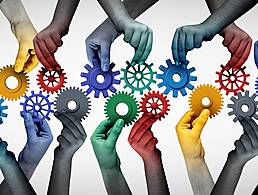Marcie Merriman of EY Americas discusses the authenticity Covid-19 has brought out in employee interactions and how the tables have turned when it comes to company perks.
Covid-19 has undeniably driven seismic shifts in how companies work across the globe, with normal business disrupted and many having to adjust to remote working for the first time. As well as organisational shifts, changes can also be seen in employee behaviours, according to Marcie Merriman, EY Americas’ cultural insights and customer strategy leader.
Merriman is a leader in the area of cultural anthropology and brand strategy with more than 25 years of experience in managing disruption, growth and change. I spoke to her about the long-term impacts of Covid-19 on HR strategy and what companies can do now to prepare for the future of work.
‘As more companies go remote, providing the option of working in an office will instead become the perk’
– MARCIE MERRIMAN
What are some of the new behaviours Covid-19 is instilling in workers?
Covid-19 is instilling a greater sense of gratitude. Many employees who may not have loved their jobs or felt appreciated previously are showing more gratitude for what they have. Since the pandemic started, many companies have really stepped up in concern and care for their employees.
This is continuing a pre-pandemic trend where employees are looking to companies for the type of leadership previously reserved for government. Because of this, we’re seeing a greater trust in organisations, as employees are looking to their companies to help and protect them.

Marcie Merriman. Image: EY
In the past, there was a negative outlook, especially from older generations, about employees working from home. I’ve been working from home on and off for the last 20 years, and I work 10 times harder and longer whenever I do. In the past, the die-hard office people would often scoff at people who worked from home, not trusting they would actually do anything without a manager watching over them.
With managers now being forced to work from home themselves, they are experiencing the realities: gaining the ability to focus and increase productivity, but having a hard time turning it off, leading to endless hours. There’s almost a new awakening of what those three words mean, and this new view of working from home is truly transforming us into the future.
How will these behaviours translate when companies move back to the office?
If and when companies start moving back into the office, there will be more flexibility, allowing employees to work from home as it makes sense for themselves and their teams. We will also see an increased focus on productivity and value produced versus hours put in.
Prior to Covid-19, working from home was a perk. People, however, will have a greater appreciation of communities and they will crave human contact. As more companies go remote, providing the option of working in an office will instead become the perk.
People will be looking for companies that offer an option of a physical environment in order to build and maintain a community.
Are there any steps companies should take now to prepare for that transition?
The biggest steps companies can now be taking are looking at ways to maintain a community and building connections between employees. For example, many companies are currently doing virtual happy hours or virtual game sessions, and they’re not focused on work or getting work done during these times. They are instead helping employees get to know one another on a personal level like never before.
It’s really important for Gen Z to build deep and meaningful relationships with the people they work with. Because being part of communities often drives creativity and better mental spaces, companies should be thinking of how they can continue fostering personal connections post-Covid-19.
Do you foresee any long-term trends emerging in how we work as a result of Covid-19?
The long-term trends I see emerging in how we work as a result of Covid-19 include companies having a greater flexibility in remote working, being more intentional to building a sense of community and focusing more on productivity rather than hours put in.
We’re all currently seeing into employees’ homes and, as a result, employees are being more open about the challenges they’re facing. Employees are also having the liberty to dress however they’d like, and because everyone is in the same boat, they don’t feel guilty about it as they may have in the office.
It is very likely that employees will extend this vulnerability and authenticity even while back in the office, creating an even stronger sense of community.




